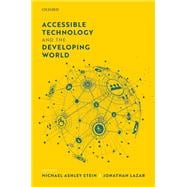When digital content and technologies are designed in a way that is inaccessible for persons with disabilities, they are locked out of commerce, education, employment, and access to government information. In developing areas of the world, as new technical infrastructures are being built, it is especially important to ensure that accessibility is a key design goal. Unfortunately, nearly all research on Information and Communication Technology (ICT) accessibility and innovation for persons with disabilities-whether from the legal, technical, or development fields-has focused on developed countries, with very little being written about developing world initiatives. Accessible Technology and the Developing World aims to change this, by bringing increased attention to ICT accessibility in developing areas.
This book brings together a unique combination of contributors with diverse disciplinary backgrounds, including authors from well-known non-governmental organizations, significant United Nations entities, and universities in both the developing and developed world. Together, they present a unique and much needed review of this critical and growing area of work, and primarily address three core themes - the lack of attention given to innovations taking place in the developing world, the need to ensure that infrastructures in the Global South do not present barriers to people with disabilities, and the need to exercise caution when applying techniques from the Global North to the Global South that won't transfer effectively.
This book will be of use to researchers in the fields of civil rights, development studies, disability rights, disability studies, human-computer interaction and accessibility, human rights, international law, political science, and universal design.








